Michael Swanwick's Blog, page 160
November 18, 2013
The Name of the Genre
.
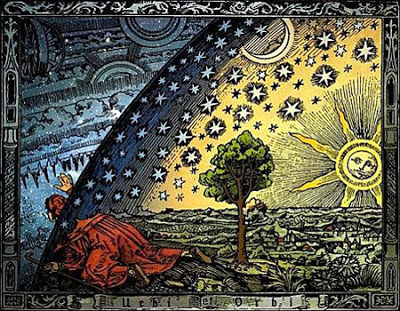
We've pretty much settled on science fiction as being the best name for the sort of stuff we in genre like to read and write. Is it really the best possible term? Probably not. But, as with democracy, before we get too critical, we should probably consider the alternatives.
Going back to the beginning, Jules Verne wrote Voyages Extraordinaires , emphasizing the adventure aspect of his fiction. H. G. Wells, a far better prose stylist but a little looser with the laws of science -- when asked his opinion of Wells' First Men in the Moon, Verne snapped, "Show me this cavorite! -- wrote what were then called Scientific Romances . (The term predates him, but I'm not pretending to any rigorous scholarship in this blogpost.)
Then came the tireless science enthusiast, inventor, and crook, Hugo Gernsback, whose magazines created science fiction as a genre and whose letter columns in those same magazines created fandom. In keeping with the aesthetics of a man who named his weirdly visionary novel Ralph 124C41+ (try saying it out loud), his moniker for this nascent literary form was a real jaw-acher: Scientifiction .
Obviously, that couldn't endure and with the demise of Gernsback's magazines, the acceptable term among cognoscenti became Science Fiction . Shortly thereafter, the abbreviation SF came into common insider use, sometimes capitalized and other times not.
Alas, uber-fan, agent, magazine editor, and compulsive collector Forrest J. Ackerman, seeking his place in literary history, came up with something shorter and catchier: Sci-Fi. It caught on. Sort of. Mostly, it became attached to 1950s monster movies. Fans pointedly used "science fiction" to refer to the sort of literature they valued, while reserving Ackerman's term for schlock. Thus causing a great deal of snarking by those in the know directed at innocent civilians who thought they were simply using the proper term.
(Not long ago, the SciFi Channel, whose name roused outrage in fandom when it first came out, officially changed their name to SyFy, a Polish word meaning "syphilis." Their intention being to distance themselves from the schlock implications of the old term. Which was ironic, given how greatly many of its own shows contributed to exactly that impression.)
Somewhere in there, Robert A. Heinlein made a valiant effort to point out the inherent virtues of the genre by giving it a more respectable title: Speculative Fiction . This had the virtue of getting around the fact that a lot of the works we most highly prize, such as Ray Bradbury's, while excellent on the speculative front, weren't terribly strong on the science.
Alas, though Harlan Ellison spent decades championing this term (and excoriating the use of "sci-fi"), it never caught on among the general public. So it must be considered a failure. If Harlan couldn't make it stick, nobody could.
Today we have, through attrition and the will of the masses, settled upon Science Fiction as the one true name for our beloved genre. Just in time, as John Clute would tell you, for its death.
But that's another story, for another time.
*

We've pretty much settled on science fiction as being the best name for the sort of stuff we in genre like to read and write. Is it really the best possible term? Probably not. But, as with democracy, before we get too critical, we should probably consider the alternatives.
Going back to the beginning, Jules Verne wrote Voyages Extraordinaires , emphasizing the adventure aspect of his fiction. H. G. Wells, a far better prose stylist but a little looser with the laws of science -- when asked his opinion of Wells' First Men in the Moon, Verne snapped, "Show me this cavorite! -- wrote what were then called Scientific Romances . (The term predates him, but I'm not pretending to any rigorous scholarship in this blogpost.)
Then came the tireless science enthusiast, inventor, and crook, Hugo Gernsback, whose magazines created science fiction as a genre and whose letter columns in those same magazines created fandom. In keeping with the aesthetics of a man who named his weirdly visionary novel Ralph 124C41+ (try saying it out loud), his moniker for this nascent literary form was a real jaw-acher: Scientifiction .
Obviously, that couldn't endure and with the demise of Gernsback's magazines, the acceptable term among cognoscenti became Science Fiction . Shortly thereafter, the abbreviation SF came into common insider use, sometimes capitalized and other times not.
Alas, uber-fan, agent, magazine editor, and compulsive collector Forrest J. Ackerman, seeking his place in literary history, came up with something shorter and catchier: Sci-Fi. It caught on. Sort of. Mostly, it became attached to 1950s monster movies. Fans pointedly used "science fiction" to refer to the sort of literature they valued, while reserving Ackerman's term for schlock. Thus causing a great deal of snarking by those in the know directed at innocent civilians who thought they were simply using the proper term.
(Not long ago, the SciFi Channel, whose name roused outrage in fandom when it first came out, officially changed their name to SyFy, a Polish word meaning "syphilis." Their intention being to distance themselves from the schlock implications of the old term. Which was ironic, given how greatly many of its own shows contributed to exactly that impression.)
Somewhere in there, Robert A. Heinlein made a valiant effort to point out the inherent virtues of the genre by giving it a more respectable title: Speculative Fiction . This had the virtue of getting around the fact that a lot of the works we most highly prize, such as Ray Bradbury's, while excellent on the speculative front, weren't terribly strong on the science.
Alas, though Harlan Ellison spent decades championing this term (and excoriating the use of "sci-fi"), it never caught on among the general public. So it must be considered a failure. If Harlan couldn't make it stick, nobody could.
Today we have, through attrition and the will of the masses, settled upon Science Fiction as the one true name for our beloved genre. Just in time, as John Clute would tell you, for its death.
But that's another story, for another time.
*
Published on November 18, 2013 08:12
November 15, 2013
The Science Fiction Museum
.

Over Philcon weekend, I chatted with Leo Imperial, the Vice President for Programs and Visitor Experience for a museum that doesn't yet exist. Which is why he was engaged in outreach to the SF community.
The vision of a group of volunteers is to create a major museum -- the Science Fiction Museum -- dedicated to my favorite genre of fiction in Washington, D.C. Their immediate goal is to create a preview room, which could be used to raise funds for the museum.
I'm not sure how I feel about the basic idea, because as a writer I see the museums of the world as serving as a virtual museum of not only science fiction but of all literature. But I like their vision and I like their passion and I wish them well.
You can find the Museum of Science Fiction blog here. There are links that will answer any questions you may have.
.

Over Philcon weekend, I chatted with Leo Imperial, the Vice President for Programs and Visitor Experience for a museum that doesn't yet exist. Which is why he was engaged in outreach to the SF community.
The vision of a group of volunteers is to create a major museum -- the Science Fiction Museum -- dedicated to my favorite genre of fiction in Washington, D.C. Their immediate goal is to create a preview room, which could be used to raise funds for the museum.
I'm not sure how I feel about the basic idea, because as a writer I see the museums of the world as serving as a virtual museum of not only science fiction but of all literature. But I like their vision and I like their passion and I wish them well.
You can find the Museum of Science Fiction blog here. There are links that will answer any questions you may have.
.
Published on November 15, 2013 15:56
November 13, 2013
A Writer's Guilty Pleasures
.
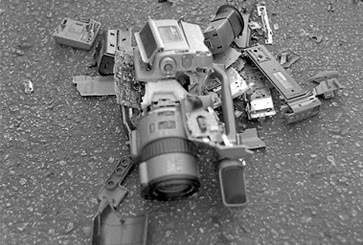
As always, I'm on the road again. As is my camera, currently winging its way to a repair facility in Nebraska. So I thought I'd share with you a handful of guilty pleasures whose satisfactions (for me) derive directly from my being a writer.
Here they are:
On Writing by John Gardner. Gardner's books on how to write are unsurpassed in their seriousness and in how they portray writing as a holy chore. Porn for writers, really.
Shakespeare in Love. More porn for writers. Tom Stoppard has always been weak on plot. But he was brought into the project after the original writer had come up with a robust plot and given the chore of witting it up. Which he did beautifully. But the core plot, which conflates romantic love with the desire to become a better writer, is what makes this movie.
Doorways in the Sand by Roger Zelazny. Zelazny's work was always clever. But in this novel, about a perpetual undergrad, spending his time climbing buildings and ducking graduation, who gets caught up in an interstellar power struggle, involving a viral gem, doodlehums, a condescending kangaroo, and really good whiskey, is an unending cascade of cleverness for its own sake. It looks effortless, it won't make you a better person, and it can always be read again.
Hitchcock/Truffaut. In 1962, Francois Truffaut interviewed Hitchcock about every film he had made to date in order. Later published as a full-length book, it's the ultimate movie-geek look at how the movies were made and why they were made that way. Chockablock with good advice (never kill a child; the audience won't forgive you for it) from a man who knew what he was doing.
The New York Review of Books. A terrible waste of time that could be better spent actually reading the books being analyzed. Entertaining, though.
And that's my list . . .
What's yours?
*

As always, I'm on the road again. As is my camera, currently winging its way to a repair facility in Nebraska. So I thought I'd share with you a handful of guilty pleasures whose satisfactions (for me) derive directly from my being a writer.
Here they are:
On Writing by John Gardner. Gardner's books on how to write are unsurpassed in their seriousness and in how they portray writing as a holy chore. Porn for writers, really.
Shakespeare in Love. More porn for writers. Tom Stoppard has always been weak on plot. But he was brought into the project after the original writer had come up with a robust plot and given the chore of witting it up. Which he did beautifully. But the core plot, which conflates romantic love with the desire to become a better writer, is what makes this movie.
Doorways in the Sand by Roger Zelazny. Zelazny's work was always clever. But in this novel, about a perpetual undergrad, spending his time climbing buildings and ducking graduation, who gets caught up in an interstellar power struggle, involving a viral gem, doodlehums, a condescending kangaroo, and really good whiskey, is an unending cascade of cleverness for its own sake. It looks effortless, it won't make you a better person, and it can always be read again.
Hitchcock/Truffaut. In 1962, Francois Truffaut interviewed Hitchcock about every film he had made to date in order. Later published as a full-length book, it's the ultimate movie-geek look at how the movies were made and why they were made that way. Chockablock with good advice (never kill a child; the audience won't forgive you for it) from a man who knew what he was doing.
The New York Review of Books. A terrible waste of time that could be better spent actually reading the books being analyzed. Entertaining, though.
And that's my list . . .
What's yours?
*
Published on November 13, 2013 05:48
November 11, 2013
From Dragonstairs Press -- Tumbling!
.
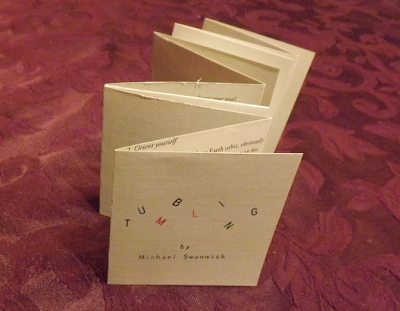
My favorite publisher in all the world, Marianne Porter, has put my newest publication up for sale on the Dragonstairs Press website.
"Tumbling" was commissioned by and written for Marianne to be published in accordion format by her nanopress. Its protagonist is self-doubting astronaut Lizzie O'Brien, who was also the protagonist of "Slow Life," and the story documents an incident occurring during her training.
Here's how it begins:
"Tumbling" is roughly a thousand words, and the booklet is three inches by three inches. It's cut and folded from a single 8 ½" by 11" sheet of paper and is twelve "pages" long. Issued in a signed and numbered edition of 50, and available for ten dollars from the Dragonstairs website.
Click here to find out more.
*

My favorite publisher in all the world, Marianne Porter, has put my newest publication up for sale on the Dragonstairs Press website.
"Tumbling" was commissioned by and written for Marianne to be published in accordion format by her nanopress. Its protagonist is self-doubting astronaut Lizzie O'Brien, who was also the protagonist of "Slow Life," and the story documents an incident occurring during her training.
Here's how it begins:
1. Don’t panic.
Lizzie O’Brien, tumbling head over heels with no idea where she was or what had happened, tried to seize hold of herself. Oh dear Lord, she thought. What have I done now? Is anyone hurt? The sky was black around her. A bright blue-and-white Earth looped over and over her. She was spinning on at least two axes. She could tell by the wobbly way the Earth moved from side to side.
"Tumbling" is roughly a thousand words, and the booklet is three inches by three inches. It's cut and folded from a single 8 ½" by 11" sheet of paper and is twelve "pages" long. Issued in a signed and numbered edition of 50, and available for ten dollars from the Dragonstairs website.
Click here to find out more.
*
Published on November 11, 2013 08:56
November 8, 2013
Convention Etiquette for Writers
.
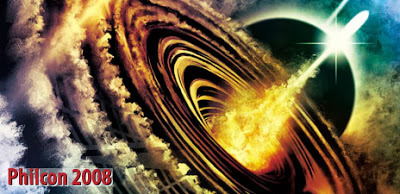
Decades ago, when he was guest of honor at Philcon -- it may even have been his first goh gig -- William Gibson, then new to the literary superstar biz, said to me, "When I get home, I'm going to have to lie down in a dark room for a day with a damp cloth over my ego, until the swelling goes down."
Anybody who's ever been a writer guest at a science fiction con knows what he meant. It's a very intense experience. You put a great deal of time into being both modest and impressively intelligent. The latter because you want to be sure the con committee are getting good weight after spending rather a lot on your room and airfare, and the former because you want the fans to think well of you. If you fail at either, you'll feel bad about yourself afterward. But even if you succeed, you've just spent three days presenting an unrealistically shiny version of yourself.
You really do need to decompress afterward.
But you can make things easier on yourself. If you're a guest, a panelist, or in any other way a participant a one of these things, you should:
1. Be polite. This includes not hogging the microphone on panels.
2. Don't drink too much.
3. Don't try to take advantage of the event. I was told once of a guest of honor -- no name was given me -- who immediately upon moving into his hotel suite had the hotel send out all his clothes to be dry cleaned at the con committee's expense. They paid, but I was reliably informed that he was never invited to be goh at a science fiction convention again. Because the people who put such things on talk to each other.
4. Suffer fools gladly. Because -- not always or even usually, but often enough -- there will be fools. I am thinking of course of the fan who wanted me to explain to him why he'd never heard of me. At least six times during that convention he sought me out to articulate how well-read he was in genre and how clueless as to my existence. I'm sure that my not telling him off will count in my favor when the Day of Judgment comes.
Of course there does come a time (I am thinking of the fan who explained to me at great length how much he hated something I'd written -- and then kept coming back to apologize for having said and then sidetracking himself into repeating his original rant), when you have to kindly, even lovingly, explain that the point has been made and that he should find a new object to fixate his derangement upon.
In such cases, however, it's considered bad form to recommend a substitute writer by name.
And this weekend . . .
Today through Sunday, I'll be chillin' at Chillcon. Which is what my son's friends used to call the Philcons held in Cherry Hill, New Jersey, before they got so discouraged with the event that they stopped coming.
Here's my schedule:
Friday
10:00 PM in Crystal Ballroom Three (1 hour)
DO WE STILL BELIEVE IN YESTERDAY'S TOMORROW?
[Panelists: Michael J. Walsh (mod), Allen Steele, Gregory Frost, Darrell Schweitzer, Michael Swanwick]
The standard science fiction "future" of the past, which came
complete with can-do engineers in space suits conquering the
universe, is now based on fiction more than 50 years old. How valid
is this vision of the future
Saturday
Sat 12:00 PM in Plaza III (Three) (1 hour)
DO YOU REALLY WANT TO LIVE IN A UTOPIA?
[Panelists: Edward Carmien (mod), Tobias Cabral, Alexis Gilliland, Michael Swanwick, Ian Randal Strock]
People may claim that they are happy in fictional utopias but on
closer inspection, the happiest utopia seems inherently flawed.
Because utopian happiness rarely generates the drama necessary to
drive a story, does this mean that all fictional utopias have
fundamental problems
1:00 PM in Plaza IV (Four) (1 hour)
WHO IS AVRAM DAVIDSON, AND WHY ARE THEY STILL TALKING ABOUT HIM?
[Panelists: Michael J. Walsh (mod), Darrell Schweitzer, Michael Swanwick, Gardner Dozois]
The Encyclopedia of Science Fiction said of him "He is perhaps sf's
most explicitly literary author." Discover the works of one of
science fiction's unique geniuses
Sat 3:00 PM in Executive Suite 623 (1 hour)
READING: MICHAEL SWANWICK (1655)
I'll be reading the first chapter of Chasing the Phoenix, my new Darger & Surplus novel. But it functions as a stand-alone story, so that's okay.
6:00 PM in Plaza V (Five) (1 hour)
REMEMBERING FREDERIK POHL
[Panelists: Darrell Schweitzer (mod), Michael Swanwick, Gardner Dozois, Tom Purdom, Andrew C. Murphy]
Fred Pohl, who passed away on Sept. 2nd of 2013, was a writer who
also was a member of the first Philcon. He wrote GATEWAY, edited
GALAXY magazine and in his later years a popular award-winning
blogger ("THE WAY THE FUTURE BLOGS"). He was also one of science
fiction's grand masters. We will remember his life and work
And that's all! If you're going to be there, be sure to say hello.
Above: Yes, that's not this year's Philcon logo. But it looked nifty, so I went with it.
*

Decades ago, when he was guest of honor at Philcon -- it may even have been his first goh gig -- William Gibson, then new to the literary superstar biz, said to me, "When I get home, I'm going to have to lie down in a dark room for a day with a damp cloth over my ego, until the swelling goes down."
Anybody who's ever been a writer guest at a science fiction con knows what he meant. It's a very intense experience. You put a great deal of time into being both modest and impressively intelligent. The latter because you want to be sure the con committee are getting good weight after spending rather a lot on your room and airfare, and the former because you want the fans to think well of you. If you fail at either, you'll feel bad about yourself afterward. But even if you succeed, you've just spent three days presenting an unrealistically shiny version of yourself.
You really do need to decompress afterward.
But you can make things easier on yourself. If you're a guest, a panelist, or in any other way a participant a one of these things, you should:
1. Be polite. This includes not hogging the microphone on panels.
2. Don't drink too much.
3. Don't try to take advantage of the event. I was told once of a guest of honor -- no name was given me -- who immediately upon moving into his hotel suite had the hotel send out all his clothes to be dry cleaned at the con committee's expense. They paid, but I was reliably informed that he was never invited to be goh at a science fiction convention again. Because the people who put such things on talk to each other.
4. Suffer fools gladly. Because -- not always or even usually, but often enough -- there will be fools. I am thinking of course of the fan who wanted me to explain to him why he'd never heard of me. At least six times during that convention he sought me out to articulate how well-read he was in genre and how clueless as to my existence. I'm sure that my not telling him off will count in my favor when the Day of Judgment comes.
Of course there does come a time (I am thinking of the fan who explained to me at great length how much he hated something I'd written -- and then kept coming back to apologize for having said and then sidetracking himself into repeating his original rant), when you have to kindly, even lovingly, explain that the point has been made and that he should find a new object to fixate his derangement upon.
In such cases, however, it's considered bad form to recommend a substitute writer by name.
And this weekend . . .
Today through Sunday, I'll be chillin' at Chillcon. Which is what my son's friends used to call the Philcons held in Cherry Hill, New Jersey, before they got so discouraged with the event that they stopped coming.
Here's my schedule:
Friday
10:00 PM in Crystal Ballroom Three (1 hour)
DO WE STILL BELIEVE IN YESTERDAY'S TOMORROW?
[Panelists: Michael J. Walsh (mod), Allen Steele, Gregory Frost, Darrell Schweitzer, Michael Swanwick]
The standard science fiction "future" of the past, which came
complete with can-do engineers in space suits conquering the
universe, is now based on fiction more than 50 years old. How valid
is this vision of the future
Saturday
Sat 12:00 PM in Plaza III (Three) (1 hour)
DO YOU REALLY WANT TO LIVE IN A UTOPIA?
[Panelists: Edward Carmien (mod), Tobias Cabral, Alexis Gilliland, Michael Swanwick, Ian Randal Strock]
People may claim that they are happy in fictional utopias but on
closer inspection, the happiest utopia seems inherently flawed.
Because utopian happiness rarely generates the drama necessary to
drive a story, does this mean that all fictional utopias have
fundamental problems
1:00 PM in Plaza IV (Four) (1 hour)
WHO IS AVRAM DAVIDSON, AND WHY ARE THEY STILL TALKING ABOUT HIM?
[Panelists: Michael J. Walsh (mod), Darrell Schweitzer, Michael Swanwick, Gardner Dozois]
The Encyclopedia of Science Fiction said of him "He is perhaps sf's
most explicitly literary author." Discover the works of one of
science fiction's unique geniuses
Sat 3:00 PM in Executive Suite 623 (1 hour)
READING: MICHAEL SWANWICK (1655)
I'll be reading the first chapter of Chasing the Phoenix, my new Darger & Surplus novel. But it functions as a stand-alone story, so that's okay.
6:00 PM in Plaza V (Five) (1 hour)
REMEMBERING FREDERIK POHL
[Panelists: Darrell Schweitzer (mod), Michael Swanwick, Gardner Dozois, Tom Purdom, Andrew C. Murphy]
Fred Pohl, who passed away on Sept. 2nd of 2013, was a writer who
also was a member of the first Philcon. He wrote GATEWAY, edited
GALAXY magazine and in his later years a popular award-winning
blogger ("THE WAY THE FUTURE BLOGS"). He was also one of science
fiction's grand masters. We will remember his life and work
And that's all! If you're going to be there, be sure to say hello.
Above: Yes, that's not this year's Philcon logo. But it looked nifty, so I went with it.
*
Published on November 08, 2013 07:59
November 6, 2013
From Sriharikota to Mars!
.
Many decades ago, Robert A. Heinlein caught a lot of heat for cautioning that the future in space didn't have to be American -- that it could just as easily belong to China or Japan or India. Some people thought that was racist.
Not me. I think he was just stating the obvious: That there are a lot of ambitious nations out there with smart and capable people, and that if the United States turned its back on the future, the human race would go on without us. Yes, he was making an appeal to American pride. But it's Japanese and Chinese and Indian pride that fuels their space programs.
Plus, of course, the prospect of a serious slice that incredibly lucrative space industry.
Yesterday, India launched Mangalyaan , its first probe to the planet Mars. Mars is a mission-eater and no nation has successfully reached it on their first attempt. But there's a first for everything, and I think India may well break the streak.
You can read the New York Times article here.
And it's cheap! According to NPR the total budget was only $73 million. Click here to read more.
And, speaking of the glitterati . . .
I went to the Big Apple yesterday for the NYRSF Readings at the Soho Gallery for Digital Art. Reading from their works were Fran Wilde and Rajan Khanna, both of whom recently sold their first novels. Also present but not reading was Alana Teitelbaum who by coincidence also recently sold her first novel. It was good to see her again.
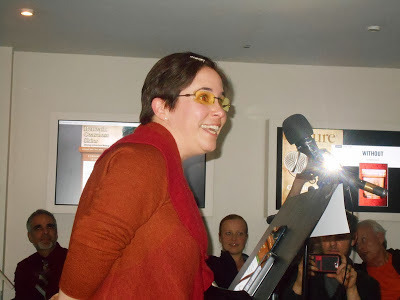
Above: Fran Wilde, reading.
*
Many decades ago, Robert A. Heinlein caught a lot of heat for cautioning that the future in space didn't have to be American -- that it could just as easily belong to China or Japan or India. Some people thought that was racist.
Not me. I think he was just stating the obvious: That there are a lot of ambitious nations out there with smart and capable people, and that if the United States turned its back on the future, the human race would go on without us. Yes, he was making an appeal to American pride. But it's Japanese and Chinese and Indian pride that fuels their space programs.
Plus, of course, the prospect of a serious slice that incredibly lucrative space industry.
Yesterday, India launched Mangalyaan , its first probe to the planet Mars. Mars is a mission-eater and no nation has successfully reached it on their first attempt. But there's a first for everything, and I think India may well break the streak.
You can read the New York Times article here.
And it's cheap! According to NPR the total budget was only $73 million. Click here to read more.
And, speaking of the glitterati . . .
I went to the Big Apple yesterday for the NYRSF Readings at the Soho Gallery for Digital Art. Reading from their works were Fran Wilde and Rajan Khanna, both of whom recently sold their first novels. Also present but not reading was Alana Teitelbaum who by coincidence also recently sold her first novel. It was good to see her again.

Above: Fran Wilde, reading.
*
Published on November 06, 2013 08:16
November 5, 2013
Because I am a Citizen . . .
.

6:45 a. m. this morning, I said to Marianne, "This is what democracy looks like."
She took one look at my haggard, half-asleep face and burst out laughing.
Then I gulped down a cup of coffee and we walked over to Roxborough High and voted. Marianne was #2 and I was #3. This election is for judges and related officials only, so the turnout is guaranteed to be low. And it required a fair amount of work to get even a rudimentary idea of who was worth voting for. But that didn't stop either of us.
I always vote. The assembled members of the NRA will voluntarily surrender all their guns long before anyone manages to pry the ballot out of my cold, dead hand. I know that a lot of people are cynical about its value and consequently don't bother. To them I will say this: Your opting out only makes my vote and the Tea Party's votes worth more.
There can't be a lot of people who are happy about both those facts.
Above: Just to be clear, I applaud the Tea Party folks for voting, and for voting their consciences. I say that with no irony whatsoever.
*

6:45 a. m. this morning, I said to Marianne, "This is what democracy looks like."
She took one look at my haggard, half-asleep face and burst out laughing.
Then I gulped down a cup of coffee and we walked over to Roxborough High and voted. Marianne was #2 and I was #3. This election is for judges and related officials only, so the turnout is guaranteed to be low. And it required a fair amount of work to get even a rudimentary idea of who was worth voting for. But that didn't stop either of us.
I always vote. The assembled members of the NRA will voluntarily surrender all their guns long before anyone manages to pry the ballot out of my cold, dead hand. I know that a lot of people are cynical about its value and consequently don't bother. To them I will say this: Your opting out only makes my vote and the Tea Party's votes worth more.
There can't be a lot of people who are happy about both those facts.
Above: Just to be clear, I applaud the Tea Party folks for voting, and for voting their consciences. I say that with no irony whatsoever.
*
Published on November 05, 2013 07:13
November 4, 2013
The Only Writing Advice You'll Ever Need
.

I remember when I was young and unpublished. I was happy with the first part of that situation but not the second, so I was always writing and always looking for a shortcut to success.
What I found is that there is none. You write, day in and day out, whether you feel like it or not. Eventually, if you have the potential, you become good enough to be published.
That obligation, to write whether you want to or not, never goes away.
Case in point: I really don't feel like writing today. And I really, really, really don't feel like writing a blog post. But here I am. Because that's what it takes.
Chop wood, carry water. That's all the writing advice you'll ever need.
Above: My office. It's astonishing how much clutter I'm not showing you.
*

I remember when I was young and unpublished. I was happy with the first part of that situation but not the second, so I was always writing and always looking for a shortcut to success.
What I found is that there is none. You write, day in and day out, whether you feel like it or not. Eventually, if you have the potential, you become good enough to be published.
That obligation, to write whether you want to or not, never goes away.
Case in point: I really don't feel like writing today. And I really, really, really don't feel like writing a blog post. But here I am. Because that's what it takes.
Chop wood, carry water. That's all the writing advice you'll ever need.
Above: My office. It's astonishing how much clutter I'm not showing you.
*
Published on November 04, 2013 13:46
October 31, 2013
Your Halloween Cocktail -- the Ghost Manhattan!
.

Here at the American Cocktail Laboratory, we are always experimenting, always researching, always working to discover or if need be invent the right cocktail for the occasion.
Tonight is Halloween. So what better time to imbibe in spirits? The question answers itself.
To celebrate Samhain, Marianne has created a pale and perfect concoction -- the Ghost Manhattan. Beautiful, innit? And it tastes as good as it looks.
Here's the recipe.
Ghost Manhattan
2 parts white whiskey (in this case, Jim Beam's "Jacob's Ghost," appropriately enough)
1 part dry vermouth
2 dashes lemon bitters
Shake vigorously over ice, pour, and add an orange twist.
Enjoy!
Above: The noble drink atop our wood stove. It brings to mind the immortal line from Bunnicula Turns 21 -- "It was a white Manhattan!"
*

Here at the American Cocktail Laboratory, we are always experimenting, always researching, always working to discover or if need be invent the right cocktail for the occasion.
Tonight is Halloween. So what better time to imbibe in spirits? The question answers itself.
To celebrate Samhain, Marianne has created a pale and perfect concoction -- the Ghost Manhattan. Beautiful, innit? And it tastes as good as it looks.
Here's the recipe.
Ghost Manhattan
2 parts white whiskey (in this case, Jim Beam's "Jacob's Ghost," appropriately enough)
1 part dry vermouth
2 dashes lemon bitters
Shake vigorously over ice, pour, and add an orange twist.
Enjoy!
Above: The noble drink atop our wood stove. It brings to mind the immortal line from Bunnicula Turns 21 -- "It was a white Manhattan!"
*
Published on October 31, 2013 13:20
October 30, 2013
A City and Its MIrror
.
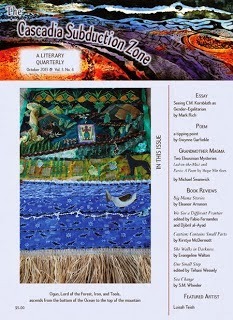
My contributor's copies of The Cascadia Subduction Zone arrived yesterday. This is a feminist genre literary quarterly and normally I wouldn't dream of writing for such a journal because I am very suspicious of men who proclaim themselves feminists. I mean . . . they do tend to be loud and overbearing guys, don't they? Though I'm sure there must be exceptions.
But Nisi Shawl is the reviews editor and she hit me up for an article on the poet and novelist Hope Mirrlees. And because Nisi is a good friend, it was hard for me to say no. So, in addition to a long article and very good article by Mark Rich on C. M. Kornbluth as gender-egalitarian, six detailed book reviews, a poem by Gwynne Garfinkle, and artwork by Luisah Teish, there is my own "Two Eleusinian Mysteries - Lud-in-the-Mist and Paris: A Poem by Hope Mirrlees. "
Years ago, I wrote a slim book-length study of Mirrlees titled Hope-in-the-Mist: the Extraordinary Career and Mysterious Life of Hope Mirrlees. Anyone who's read that will be familiar with most of what I wrote in this article. But I did have a good observation about Paris: A Poem that came long after its publication, which is included here:

My contributor's copies of The Cascadia Subduction Zone arrived yesterday. This is a feminist genre literary quarterly and normally I wouldn't dream of writing for such a journal because I am very suspicious of men who proclaim themselves feminists. I mean . . . they do tend to be loud and overbearing guys, don't they? Though I'm sure there must be exceptions.
But Nisi Shawl is the reviews editor and she hit me up for an article on the poet and novelist Hope Mirrlees. And because Nisi is a good friend, it was hard for me to say no. So, in addition to a long article and very good article by Mark Rich on C. M. Kornbluth as gender-egalitarian, six detailed book reviews, a poem by Gwynne Garfinkle, and artwork by Luisah Teish, there is my own "Two Eleusinian Mysteries - Lud-in-the-Mist and Paris: A Poem by Hope Mirrlees. "
Years ago, I wrote a slim book-length study of Mirrlees titled Hope-in-the-Mist: the Extraordinary Career and Mysterious Life of Hope Mirrlees. Anyone who's read that will be familiar with most of what I wrote in this article. But I did have a good observation about Paris: A Poem that came long after its publication, which is included here:
I just thought you might like to know that.
*
Published on October 30, 2013 08:18
Michael Swanwick's Blog
- Michael Swanwick's profile
- 546 followers
Michael Swanwick isn't a Goodreads Author
(yet),
but they
do have a blog,
so here are some recent posts imported from
their feed.



